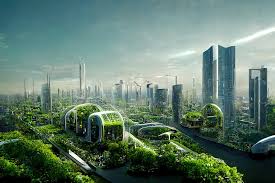The Sustainable Cities of the Future
In an era of rapid urbanisation and environmental challenges, the concept of sustainable cities has emerged as a crucial solution for creating a better future for generations to come. Sustainable cities are designed to meet the needs of their residents while minimising their impact on the environment.
Key Features of Sustainable Cities
Sustainable cities incorporate various features and practices that promote environmental, social, and economic sustainability. These include:
- Efficient public transportation systems to reduce reliance on private vehicles and decrease carbon emissions.
- Green spaces such as parks, urban forests, and rooftop gardens that improve air quality and provide recreational areas for residents.
- Renewable energy sources like solar panels and wind turbines to power buildings and infrastructure sustainably.
- Waste management systems that prioritise recycling, composting, and reducing overall waste generation.
- Smart technologies for monitoring energy consumption, water usage, and traffic flow to optimise resource efficiency.
The Benefits of Sustainable Cities
The transition towards sustainable cities offers a range of benefits for both residents and the environment. Some key advantages include:
- Improved air quality and reduced pollution levels leading to better public health outcomes.
- Enhanced resilience to climate change impacts such as extreme weather events and rising temperatures.
- Creation of green jobs in sectors like renewable energy, urban agriculture, and sustainable transport.
- Promotion of social equity by providing access to affordable housing, healthcare, education, and public amenities for all residents.
Challenges Ahead
While the vision of sustainable cities is promising, there are challenges that must be addressed to make it a reality. These include:
- Funding constraints for implementing sustainable infrastructure projects on a large scale.
- Policies that prioritise short-term economic gains over long-term sustainability goals.
- Social inequalities that can hinder equal access to sustainable resources and services among diverse populations.
The Road Ahead
To overcome these challenges and build truly sustainable cities of the future, collaboration between governments, businesses, communities, and individuals is essential. By working together towards common goals and embracing innovation and creativity in urban planning, we can create vibrant, resilient cities that thrive in harmony with nature.
Five Essential Strategies for Building Sustainable Cities of the Future
- Promote the use of renewable energy sources such as solar or wind power
- Encourage public transportation and cycling to reduce reliance on cars
- Implement green spaces and urban agriculture for improved air quality and food production
- Support sustainable building practices like using eco-friendly materials and designs
- Embrace smart technology for efficient resource management and waste reduction
Promote the use of renewable energy sources such as solar or wind power
Promoting the use of renewable energy sources, such as solar or wind power, is a crucial step towards building sustainable cities of the future. By harnessing the power of these clean and abundant resources, cities can reduce their reliance on fossil fuels and significantly lower carbon emissions. Implementing solar panels on rooftops and wind turbines in strategic locations not only helps to generate clean electricity but also creates a more resilient and self-sufficient energy infrastructure. Embracing renewable energy technologies paves the way for a greener and more environmentally friendly urban environment, ensuring a brighter and more sustainable future for generations to come.
Encourage public transportation and cycling to reduce reliance on cars
Encouraging the use of public transportation and cycling is a key strategy in creating sustainable cities of the future. By promoting these alternative modes of transport, cities can reduce congestion, air pollution, and carbon emissions associated with car travel. Investing in efficient public transportation systems and cycling infrastructure not only improves urban mobility but also enhances the overall quality of life for residents. Embracing these sustainable modes of transport will not only benefit the environment but also promote healthier and more liveable cities for generations to come.
Implement green spaces and urban agriculture for improved air quality and food production
Implementing green spaces and urban agriculture in sustainable cities of the future can have a profound impact on both the environment and the well-being of residents. By incorporating parks, urban forests, rooftop gardens, and community farms into urban landscapes, cities can enhance air quality, reduce pollution, and provide fresh produce locally. These green spaces not only act as natural filters for air pollutants but also contribute to cooling urban areas and promoting biodiversity. Additionally, urban agriculture initiatives offer opportunities for food production within city limits, reducing the carbon footprint associated with transporting food from distant locations. Overall, integrating green spaces and urban agriculture is a key strategy for creating healthier and more sustainable cities for generations to come.
Support sustainable building practices like using eco-friendly materials and designs
Supporting sustainable building practices, such as utilising eco-friendly materials and designs, is a crucial step towards creating the sustainable cities of the future. By incorporating environmentally conscious elements into construction projects, we can reduce the carbon footprint of buildings, improve energy efficiency, and promote a healthier living environment for residents. Embracing eco-friendly materials and designs not only benefits the environment but also contributes to the overall resilience and sustainability of urban infrastructure in the long run.
Embrace smart technology for efficient resource management and waste reduction
Embracing smart technology in the development of sustainable cities of the future is essential for efficient resource management and waste reduction. By integrating innovative solutions such as IoT sensors, data analytics, and automation systems, cities can optimise energy usage, water consumption, and waste disposal processes. This not only enhances operational efficiency but also minimises environmental impact, leading to a more sustainable urban environment for residents.
